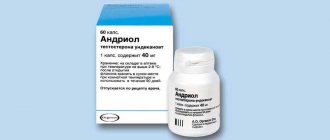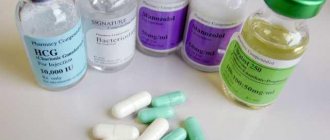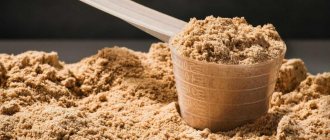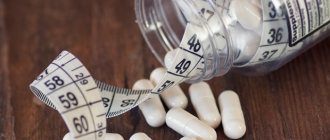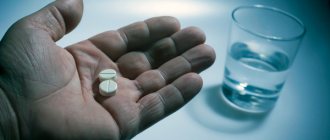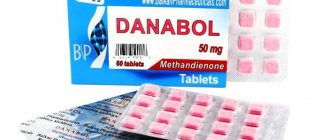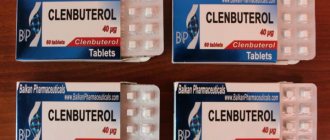Photo: tarifi.info Somatotropin
(growth hormone, HGH, ST) is a substance that is produced in the human body and is responsible for the development of the skeletal system and internal organs. Protein regulation is carried out in the center of the endocrine system - the hypothalamus, which is part of the brain.
The hypothalamus controls growth hormone. The substance itself is synthesized in the anterior lobe of the pituitary gland, but the signal for release is given by the brain structure. Growth hormone is produced inconsistently. There are 3-4 peaks of activity per day. The most powerful is at night, after falling asleep. It is known which gland produces growth hormone. Why is it needed?
Where is growth hormone produced?
The hormone is produced in an endocrine gland called the pituitary gland. This gland is located at the base of the brain and has a characteristic notch. You can often hear another name for it – sella turcica. The pituitary gland itself is under the control of the hypothalamus, which in turn inhibits or, conversely, increases the production of the hormone. The formation of growth hormone has a wave character. During the day, the substance has several spikes in its content level. The hormone reaches its maximum value a few hours after a person falls asleep, when the deep sleep phase begins.
Why is it necessary?
The name alone already suggests that somatotropin affects the growth of bones and the entire human body. From this we can conclude that the most active production of the substance occurs in childhood and adolescence. Already from the age of 15, the production of the hormone gradually decreases. After 20 years, the level of the substance stabilizes, and after 30 it begins to decline, lasting until the end of life. At the age of approximately 60 years, somatotropin will be produced at only 40% of the required norm.
If children and adolescents need the hormone for active growth, then in adults this substance helps strengthen joints and bones and helps ligaments heal.
Secretion of somatotropin
A larger amount of somatotropin is produced by the pituitary gland. Fully 50% of the cells are called somatotropes. They produce the hormone. It got its name because the peak of secretion occurs during the phase of rapid development in adolescence. The saying that children grow up in their sleep is quite justified. The reason is that the maximum secretion of the hormone is observed in the first hours of deep sleep.
Basic norm in blood and peak fluctuations during the day
The normal level of somatropin in the blood is about 1-5 ng/ml. During concentration peaks, the amount increases to 10-20 ng/ml, and sometimes even to 45 ng/ml. There may be several such surges throughout the day. The intervals between them are about 3-5 hours. The most predictable highest peak is characteristic of the period 1-2 hours after falling asleep.
Age-related changes
The highest concentration of somatropin is observed at the stage of 4-6 months of intrauterine development. This is approximately 100 times more compared to an adult. Further, the concentration of the substance begins to decrease with age. This occurs between the ages of 15 and 20. Then comes the stage when the amount of somatropin remains stable - up to 30 years. Subsequently, the concentration decreases again until old age. At this stage, the frequency and amplitude of secretion peaks decreases. They are maximum in adolescents during intensive development during puberty.
What time is it produced?
About 85% of somatropin produced occurs between 12 and 4 am. The remaining 15% is synthesized during daytime sleep. For this reason, for normal development, children and adolescents are recommended to go to bed no later than 21-22 hours. In addition, you should not overeat before going to bed. Food stimulates the release of insulin, which blocks the production of somatropin.
In order for the hormone to benefit the body in the form of weight loss, you need to sleep at least 8 hours a day. It is better to go to bed before 11 pm, because the largest amount of somatropin is produced from 11 pm to 2 am. Immediately after waking up, you should not have breakfast, because the body still continues to burn fat due to the synthesized polypeptide. It is better to postpone the morning meal for 30-60 minutes.
Effect on the human body
This substance has a huge number of effects on the human body. Among the main properties it is worth noting:
- Impact on adolescent growth. The effect is to lengthen the tubular bones of the body. This property can manifest itself only in the pre-pubertal period.
- Increasing the volume of muscle mass in the body. This result is achieved by inhibiting protein breakdown and activating its production. Somatropin reduces the activity of enzymes that destroy amino acids. In this way, growth hormone comes into effect. The hormone acts on the body together with insulin and epidermal growth factor.
- Production of growth hormone in the liver. This is the name given to the insulin-like variant of cell growth. In the liver, IGF-1 is produced only with the help of somatropin. Such substances affect the body only in combination.
Scientists have conducted many studies on the effects of growth hormone on the human body and the body of animals. Among the list of useful properties it is worth noting:
- Loss of excess fat cells;
- The muscle mass of a person’s body increases;
- Body tone increases;
- Sexual activity improves;
- The functioning of important organs of the body improves;
- The immune system improves its functioning and reaches the level at which it was at a young age;
- Improves bone quality;
- Blood pressure decreases;
- Cholesterol levels decrease;
- Wounds heal much faster;
- The skin becomes more elastic and elastic;
- Vision improves;
- The person’s general mood improves significantly;
- The level of attention and memory increases.
If the level of this hormone decreases, the person’s quality of life will also deteriorate. In addition, the risk of gaining excess weight and developing serious diseases will increase.
It is especially important to have normal levels of this substance in the body after injury, while losing weight or when playing sports. The level of this hormone is also influenced by a person’s diet, as well as lifestyle.
How to increase naturally
- Where to start is losing weight. Adipose tissue and its amount are directly proportional to the level of growth hormone in the body. Obese people and those with a large amount of fat in the abdominal area have low levels of somatropin and are therefore susceptible to various diseases. They conducted a study in which people with excess belly fat and those who did not have it participated. The results showed that the level of growth hormone in obese people was several times lower than in slender people.
To be more precise, it is worth saying that the level of this hormone depends more on obesity in men than in women. But be that as it may, reducing adipose tissue will be beneficial for both women and men. Fat in the abdominal area is the most dangerous among other accumulations of adipose tissue and is a factor in the development of many diseases. Losing excess weight will help get rid of problems and increase the level of growth hormone.
Intermittent fasting. Fasting at certain time intervals is a technique in dietetics; restriction in food intake should be carried out in short periods. There are several options. You can only eat 8 hours a day. For example, from 9 am to 5 pm you can eat food, the rest of the time there is complete fasting. Another way is the so-called fasting days, on which you cannot consume more than 500 calories. There should be no more than 2 such days a week.
Such intermittent fasting quickly normalizes the level of somatotropin in the body. This picture is achieved by burning fat tissue, by limiting food intake, and also by reducing insulin production.
It is known that increased levels of insulin in the blood disrupt the normal production of growth hormone. Some studies prove that fasting for several days increases the production of growth hormone by at least 300%. Moderate fasting has a positive effect on the production of somatropin.
- Taking arginine. During physical activity, many people take amino acids, including arginine. Some studies suggest that this approach does not work to increase growth hormone levels. But taking arginine without doing physical activity is quite capable of increasing somatropin in the body. Therefore, it is worth concluding that taking arginine to increase growth hormone should be done without the use of physical activity.
- Less sugar consumption. Increased insulin will cause a decrease in growth hormone levels. Research conducted by scientists has proven that somatotropin levels were lower in people with diabetes than in healthy people. Insulin levels are directly affected by the consumption of carbohydrates and sugar. In addition, when a person eats a lot of sweets, this inevitably leads to obesity. Reducing your sugar intake will not only reduce your weight, but also increase your growth hormone levels.
- Refusal to eat before bed. The production of somatotropin usually occurs at night. If you take into account the fact that many foods contribute to the production of insulin, you should avoid eating before bed. There is no direct evidence for this theory, but it is worth considering that insulin levels decrease within 3 hours after eating. It follows from this that you should finish eating at least 2 hours before bedtime.
- Intense exercise. It has been proven that high-intensity exercise can significantly increase growth hormone in the human body. How much you can increase this level depends entirely on the type of exercise, post-workout food intake and other features. If you engage in physical activity for a long time, you can reduce your weight and improve the general condition of your body.
Benefits of HGH for the body
Accelerates muscle growth
Human growth hormone is known to improve performance by stimulating collagen synthesis in skeletal muscles and tendons, thereby increasing muscle strength and endurance. One issue of the International Journal of Endocrinology published the results of studies in which 14 healthy men aged 50 to 70 years took part. They received growth hormone for 6 months. After six months, their muscle strength noticeably increased. In adults with HGH deficiency, after long-term hormonal therapy, researchers noted normalization of muscle strength, endurance, and improved thermoregulation.
Strengthens bones
This hormone is also responsible for mineral metabolism and the condition of bone tissue. Research shows that administration of HGH accelerates bone regeneration after fractures. It may also be beneficial for older people, whose bone tissue is less strong and more susceptible to fracture. Experts also noted the positive effect of HGH on the wound healing process, in particular in older people.
Promotes weight loss
HGH accelerates the process of fat breakdown. This was confirmed by the results of a study in which 24 obese people took part. For 12 weeks, half of them followed a low-calorie diet and took growth hormone, the rest only limited their daily calorie intake. According to the results of the experiment, it turned out that weight loss among those taking HGH was 1.6 times faster. At the same time, most of the weight lost came from visceral fat, which was not observed in people from the control group. Another difference between the groups: those who did not take hormones lost not only fat, but also muscle mass while losing weight. In people taking hormone therapy, muscle mass, on the contrary, increased.
Reduces the risk of cardiovascular disease
Adults with growth hormone deficiency have an increased risk of developing cardiovascular disease. Swedish scientists came to this conclusion after studying the health status of over a hundred patients. Due to the lack of the hormone, they experienced increased body weight, as well as excessively high cholesterol levels, which worsens the functioning of the cardiac system.
Increases libido
Scientific research has proven that human growth hormone is also responsible for reproductive function and libido in men. HGH deficiency can cause decreased libido and erectile dysfunction. The truth of this theory was confirmed in an experiment in which 45 men with erectile dysfunction took part. After taking a course of hormone therapy, the functioning of the reproductive system improved in 90% of them.
Improves mood and cognitive abilities
Lithuanian experts have found confirmation that taking growth hormone can improve a person’s mood, cognitive abilities, and concentration. At least, this is exactly the result that scientists noticed in patients who took HGH for 6 months.
Are synthetic substitutes dangerous?
Often, artificial substances are presented to the public as extremely dangerous additives. They often talk, even if not about danger, then certainly about the lack of beneficial properties. For a long time, even such a safe supplement as creatinine was presented as an extremely dangerous substance for the human body. An absolutely similar situation has developed around growth hormone.
Experts say that taking artificial somatropin leads to increased blood sugar and frequent swelling. But in practice, only isolated cases are known that indicate an enlargement of the leg and liver after taking a synthetic analogue of somatropin.
Good sleep for growth hormone production
You can often hear the phrase that in our dreams we grow. How are things really going? For normal synthesis of this hormone, a full 8 hours of quiet and uninterrupted sleep is necessary. After falling asleep, within a couple of hours the natural production of the substance begins.
During this period, the deep sleep phase is noted. If a person cannot fully rest at night, then during the day he should definitely get at least 2 hours of sleep. Without proper rest, proper nutrition and constant training will not give the expected results.
Use of growth hormone for diseases
The medicinal properties of the substance are actively used:
- In the treatment of nervous disorders;
- To accelerate the growth of the child.
Another common area of use of somatropin is the prevention of diseases of an aging nature.
For older patients, growth hormone improves the quality of their bones, increases mineralization, reduces the amount of fat in the body while increasing muscle tissue.
Among other things, older people experience a clear rejuvenation effect, wrinkles become less deep, and the skin acquires better tone. Among the side effects of this therapy, it is worth noting an increase in blood pressure.
For nervous disorders
Somatropin actively improves memory and mental activity. As a result of such therapy, people with low levels of growth hormone gain normal health while simultaneously increasing their standard of living. It is worth noting that an excess of this substance will have the opposite effect and a person may develop depression.
For dwarfism
Disturbed development in childhood is treated and compensated by administering pituitary gland extract every day, which stimulates the production of samotropin. The effect is produced only on the gland, but also on the entire body of the child. It is important to start using injections on time, and use such therapy until the adolescent’s reproductive system fully matures. Pituitary dwarfism today has the only treatment in the form of growth hormone injections, which are carried out in a course.
Side effects and risks of taking HGH
Nowadays, many people believe that growth hormone slows down aging. Meanwhile, experts admit: the synthetic analogue should not be perceived as an elixir of eternal youth, and even more so it cannot be used uncontrollably in the fight against age-related changes.
If you take growth hormone as part of drug therapy, and the treatment program is drawn up by a specialist, the risk of side effects is lower. But if a completely healthy person takes the substance, then the likelihood of unwanted side effects is quite high (happens in almost 30% of HGH users).
Uncontrolled use of growth hormone can cause:
- carpal tunnel syndrome (hand pain and numbness);
- increased insulin resistance;
- swelling in the arms and legs;
- muscle and joint pain;
- enlargement of breast tissue in men (gynecomastia).
In addition, growth hormone may contribute to the development of type 2 diabetes, cardiac problems, and increase the risk of certain types of cancer. Abuse of HGH leads to enlargement of fingers and toes, skeletal changes, enlargement of eye sockets, and lengthening of the jaw. Internal organs may also enlarge. And cardiomegaly (enlarged heart) is one of the most common causes of death due to growth hormone abuse. Improper use of hGH increases protein synthesis, which often causes skin problems: it thickens and becomes rough. The combination of various side effects, especially cardiomegaly, hyperglycemia, hyperlipidemia, are factors leading to a reduction in life expectancy. Some studies suggest that side effects from taking HGH are more likely to occur in older people than in younger people.
For muscles
If there is not enough growth hormone in the body of an adult, his muscles will never become prominent, like those of athletes. But many quite healthy men and women, in pursuit of pumped up muscles, begin taking courses of HGH. But is this substance so effective?
Researchers from the University of California conducted an experiment with the participation of 440 volunteers. The average age of the experiment participants was 27 years, 85% of them were men, the average body mass index was 24, and all were physically healthy. During the 20-day experiment, 303 people received an injection of HGH, the rest received a placebo. After a course of injections, the muscle mass of the experimental participants increased by an average of 2 kg. On the one hand, it looked like a win. But as it turned out later, the increase in muscle mass did not lead to an increase in strength and endurance during physical activity. As a result, the researchers concluded that the muscles of people who took injections were more likely to accumulate fluid, while in representatives of the control group, excess moisture was not retained in the tissues, and therefore there was no increase in muscle mass.
Anti-aging
To evaluate how growth hormone affects the health of older people, scientists conducted a series of studies involving 220 people. Two-thirds of the subjects were men, their average age was 69 years, and most volunteers were overweight but not obese. The dosage of growth hormone varied among individuals, and the duration of therapy varied from 2 to 52 weeks. As a result, people who regularly took HGH increased muscle mass by about 2 kg and lost about the same amount of fat. But parameters such as the amount of sugar and cholesterol in the blood, bone density, and aerobic abilities remained virtually unchanged at the end of the experiment. However, most who took HGH experienced quite a few side effects, including fluid retention in tissues, joint pain, and in men, slightly enlarged breasts. The results of the experiment forced many to change their opinion about HGH as a panacea for old age.
Products high in samotropin
Proper nutrition plays a huge role in normalizing the level of growth hormone in the human body. The diet must be properly composed and contain all the necessary components for life. It is better to eat lean dishes, because fatty foods can reduce the amount of growth hormone in the body. Among the healthy products, it is worth noting cottage cheese, buckwheat and oatmeal, chicken eggs, fish, lean beef, etc.
Thus, the level of growth hormone in the human body depends on many factors. Not only a lack of a substance will have a negative effect, but also its excess, and it is important to remember this. Use any methods to normalize samotropin levels. Without such a hormone, a person’s condition is unsatisfactory. Monitor the child’s growth level; problems identified in time can be corrected in childhood easily and without negative complications. If you want to achieve improved athletic performance, discuss taking synthetic growth hormone with your trainer and doctor.
Substances that increase hormone levels
Represented by seven main groups:
Vitamins
These are not only vitamins A, B5, B12, but also folic acid, as well as inositol hexanicotinate.
Amino acids
This category includes: glycine, carnitine, GABA, lysine, glutamine, ornithine alpha-ketoglutarate, taurine and arginine.
Minerals
This group is represented by substances such as zinc, iodine, chromium and magnesium.
Vital substances
Colostrum and Alpha GPC (alpha-glycerylphosphorylcholine), which is known to many as alpha GPC, are represented.
Hormones
The use of melatonin, DHEA, and pregnelone can also help get rid of growth hormone deficiency.
Substances of plant origin
This group includes: silymarin, forskolin (coleonol), chrysin, griffonia and tribulus.
Natural adaptogens
These are plants that increase the body’s resistance to negative effects of various types, while stimulating and toning. The most famous adaptogens are ginseng and angelica chinensis. Growth hormone can be stimulated by eating the fruits of the jujube tree, schisandra and wolfberry berries, wild yam extract, polygonum multiflorum root extract, as well as the roots of plants such as ashwagandha, astragalus and eleutherococcus.
The effectiveness of each of the listed substances has been proven through many years of research. Minerals with vitamins are found in regular multivitamins, and amino acids are present in various sports nutrition. There are also substances, including ginseng, chrysin and others, that are not included in conventional products, but are purchased separately.

